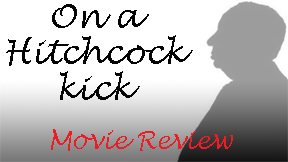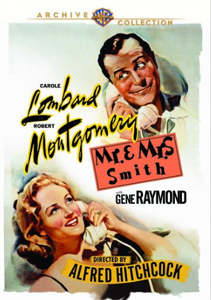In “Mr. & Mrs. Smith” (1941), the Master of Suspense proves he can make a comedy. Unfortunately, he doesn’t prove he can make a good comedy. While Alfred Hitchcock’s professional, heavily pre-planned approach to directing might be partly to blame, it comes down to the problem that Norman Krasna’s story of spouses who essentially go for a trial breakup is staggeringly lacking in laughs.
Due to mores of the time about the sanctity of marriage, the plot has New York residents David and Ann Smith (Robert Montgomery and Carole Lombard) split up because – by a legal snafu/loophole about a border between Idaho and Nevada – they aren’t actually married. Over breakfast, David had lightly wondered what it would be like to be single, so Ann punishes him for it by dating his best friend, Gene Raymond’s milquetoast Jeff.
Let the laughs ensue. Or not. While it’s true that Hitchcock can do comic relief, a viewing of the never-funny “M&MS” suggests that the humor of comic relief has a lower bar. When you’re amid a tense story, a moment of levity is not required to be uproariously funny – the tone itself can do the trick.

“Mr. & Mrs. Smith” (1941)
Director: Alfred Hitchcock
Writer: Norman Krasna
Stars: Carole Lombard, Robert Montgomery, Gene Raymond
A straight comedy must be consistently funny. To be fair, this is extremely hard to do. Despite a general attitude in the industry that comedy is a lesser genre than drama, anecdotal evidence suggests a great comedy is much harder to make – whether you’re aiming to please critics or the masses. There are far fewer comedies than dramas in the BFI and IMDb top 250s, and most of the comedies on those lists are old. A wide-appeal comedy is the hardest type of film to succeed with today.
Short on absurdity and surprises
Krasna devises a mildly amusing premise, and mildly amusing setups within that. But he never escalates the absurdity or surprises. “M&MS” is nominally labeled a “screwball” comedy, but Lombard – who died at age 33 but paved the way for Lucille Ball – looks as elegant as any Hitchcock blonde throughout. And although there are multiple scenes of David’s face being shaved, Montgomery never looks unkempt, let alone unshaven.
Smile-worthy moments include Ann noting surprise that the suit from her first date with David (three years prior) has “shrunk,” and a restaurateur’s shock that Ann and David are enthusiastic about having a meal in his dumpy diner. (It was a nice place three years ago.)
But those moments, like all others in the film, merely nudge the (too slow-paced) story forward a bit. They aren’t setups for laughs of any kind – not zingers, not pratfall comedy, and not improv, something it seems Hitchcock would never allow, even in his purest comedy.
The Master of Suspense can make a comedy, yes. If Krasna’s script had been great, Hitchcock wouldn’t have done anything to seriously squander it; he would’ve let his two fine comedy actors play it out nicely. But he doesn’t have a comedy toolbox to make something as bad as “Mr. & Mrs. Smith” into something good – nor is he willing to let his stars try for solutions.

Hitch’s comedic strength is to catch you by surprise within another genre – like in “North by Northwest,” which has so many moments of levity I wonder if it accidentally paved the way for the Zucker Brothers. If he’s in the spotlight and you’re expecting him to make you chuckle, he’ll keep you in suspense.
RFMC’s Alfred Hitchcock series reviews works by the Master of Suspense, plus remakes and source material. Click here to visit our Hitchcock Zone.

